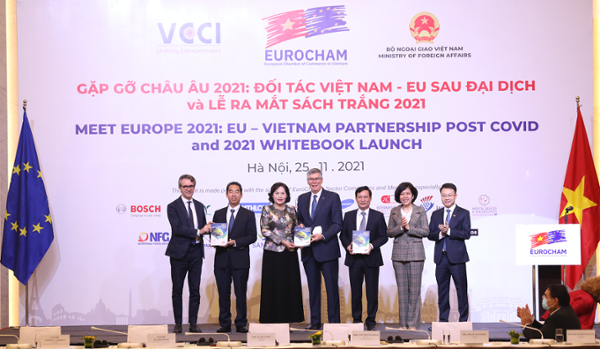HCMC – Vietnam’s stable macro-economic climate, with inflation in single digits, continues to increase investor confidence in the country’s trade and investment environment, the European Chamber of Commerce (EuroCham) said in the 2021 White Book.
Since it became a member of the World Trade Organization in 2007, Vietnam has continued to reform its legal framework to better align with global standards. As a result, the country has become more attractive to foreign enterprises and international investors.
In particular, Vietnam’s low cost of doing business, strong economic growth, booming middle class and business-friendly economic environment make it an attractive destination for foreign direct investment (FDI).
According to EuroCham, Vietnam has several advantages, including competitive production costs, a good location in Southeast Asia, strong economic performance and growing domestic consumption.
The country ranked 70th out of 190 countries included in the World Bank’s 2020 “Ease of Doing Business” study, a drop of one place since 2019, but a significant improvement over 2016 when Vietnam placed 82nd.
Vietnam performed well in many areas, including “Getting Credit” and “Paying Taxes”. However, the country did not perform very well in “Resolving Insolvencies”. Despite the slight drop in ranking, Vietnam’s score improved in 2020, reaching a total of 69.8.
Vietnam has seen strong FDI growth since the Government first opened the doors through the Law on Foreign Investment in 1987. Just over three decades later, FDI hit US$28.5 billion in 2020, according to the General Statistics Office.
This was a 25% decline compared with 2019’s record highs. However, in light of the Covid-19 pandemic, this still represents significant success.
Over 2,500 projects were given the green light last year, with almost half of the FDI flowing into the manufacturing sector. Just under one-fifth was invested in power production and distribution, with real estate and wholesale being the third- and fourth-most invested sectors.
The Government has continued to reform Vietnam’s trade and investment environment to make the country an even more attractive place to invest and do business.
EuroCham welcomes some specific improvements to the legal framework, which have further streamlined and modernized Vietnam’s business landscape since the publication of the last Whitebook and the Government’s continued efforts to ensure the double goal of fighting against Covid-19 and ensuring economic development.
In 2020 and 2021, EuroCham has continued to work closely with the Prime Minister’s Advisory Council for Administrative Procedure Reform and applauds the Government’s initiatives, such as releasing an Annual Report on the Index for Administrative Procedure Compliance Costs. This is built on a Standard Cost Model and surveys at businesses in Vietnam’s 63 cities and provinces since 2018.
The Government’s efforts have paved the way for the EU-Vietnam Free Trade Agreement (EVFTA), which was implemented on August 1, 2020.
According to EuroCham’s Business Climate Index, in the second quarter of 2021, more than 60% of business leaders believe that their companies have already benefitted from the EVFTA. However, 35% report that administrative procedures are a big barrier for them when it comes to utilizing the agreement in their businesses.
In order to attract more EU FDI to Vietnam, two out of three European business leaders think it is important to incorporate Corporate Social Responsibility in their business practices, as detailed in Chapter 13 of the EVFTA.
According to EuroCham, the relationship between Vietnam and the European Union has gone from strength to strength ever since formal ties were first established in 1990.
Today, the EU is the fifth-largest foreign investor in Vietnam. In 2020, Vietnam was the 30th-largest partner for EU goods exports (0.5%) and the tenth-largest partner for EU goods imports (2%).
The three largest importers from Vietnam in the EU were Germany (7.5 billion euros), the Netherlands (6.8 billion euros) and France (3.6 billion euros).
On the other hand, the three largest EU exporters to Vietnam were Germany (2.9 billion euros), Italy (1 billion euros) and the Netherlands (1 billion euros).
European investors are present in all sectors and industries and provinces across the length and breadth of Vietnam.
EuroCham launched the 2021 Whitebook at the EU-Vietnam Business-to-Government Conference on November 25. In its 13th edition, the annual publication brings together the insights and ideas of EuroCham’s more than 1,200 members.
In this publication, the chamber’s 18 Sector Committees bring together their international expertise and local experience to suggest practical reforms to the trade and investment environment. If taken on board, these recommendations can help Vietnam rebound and recover from the pandemic and make it an even more open, competitive and attractive market for foreign investors.
Addressing the launch event, Alain Cany, Chairman of EuroCham, shared, “Now that we have turned the corner in our fight against the pandemic, we should begin to focus on the future. Our aim must no longer be just to survive, but to thrive.
“There are huge opportunities for EU-Vietnam trade and investment post-pandemic, with the EVFTA ushering in a gradual reduction of tariffs and a mutual opening of markets. If we can unlock the full potential of this agreement – through a partnership between governments and business communities – companies and consumers on both sides will benefit.”
“With Vietnam’s effective handling of Covid-19 continuing unabated, and the global roll-out of vaccines gathering pace, we can be more optimistic about EU-Vietnam trade,” said Giorgio Aliberti, Ambassador of the European Union and Head of the European Union’s Delegation to Vietnam.
“The 13th edition of the Whitebook describes the issues that EU businesses currently identify in Vietnam. As such, it is a valuable source of inspiration for further efforts to make Vietnam more attractive as a production hub and as a destination for high-quality EU FDI. There is still great potential in our economic relations.”









